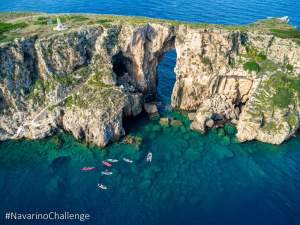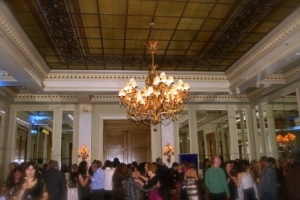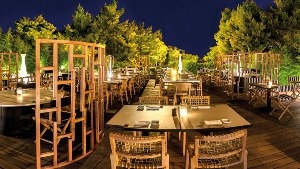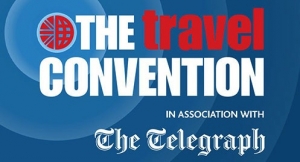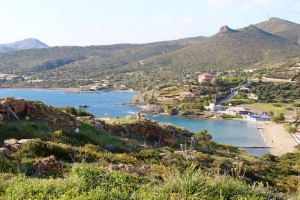More than 3,000 participations and world-class athletes in this year’s top world sports tourism event
Europe’s top sports tourism and wellness event, Navarino Challenge, celebrated its 10th anniversary on October 21-23, 2022, presenting a schedule of more than 40 activities, 16 Olympic sports and 15 Olympians at Costa Navarino and Pylos.
With the central message, “Sports Unites People” and embracing the purpose of the Olympic Movement, this year’s Navarino Challenge had more than 3,000 participations, with people of all ages, from 1 month old to 90 years old as well as people of all abilities, with more than 20 athletes with disabilities, who participated in the activities, in a full schedule that hosted the participants at The Westin Resort Costa Navarino, The Romanos, a Luxury Collection Resort and W Costa Navarino.
Navarino Challenge became a part of the amateur and professional athletes who participated, as they all shared the same values, in the presence of Olympians, having the magnificent Messinian landscape and the Navarino bay as their background scenery. The unique sports tourism celebration gathered athletes, families and children from 23 countries such as: U.S.A., Argentina, South Korea, Russia, United Kingdom, Germany, France, Finland, Netherlands, Spain, Italy, Austria and Turkey, with sports as their common denominator.
Meeting with top Ambassadors & Instructors
Navarino Challenge is probably the only event apart from the Olympic Games, in which important sports personalities and Olympians such as the athletes of the event’s Grand Sponsor, Stoiximan, Lefteris Petrounias, Miltos Tentoglou, Stefanos Ntouskos, Vasiliki Millousi, Thodoris Vlachos, Dimitris Diamantidis, Georgios Printezis, Christos Volikakis, Maria Prevolaraki, Kristian Gkolomeev, can meet and do sports together, while giving the participants the opportunity to meet Nasos Ghavelas, Grigoris Polychronidis, Makis Kalaras, Periklis Iakovakis, Panagiotis Giannakis, Evina Maltsi, Joe Arlauckas, Konstantine Dean Karnazes, Michalis Triantafyllidis, Georgia Kaltsi, George Lazaridis, Grigoris Souvatzoglou and to train with Nikos Gemelos, Christos Gatsis, Dimitris Moros, Alexandros Nikolaidis, Christina Flampouri and Mandy Persaki.
A night dedicated to the 10 years of Navarino Challenge
On Saturday night the awards ceremony for the event’s 10-years anniversary took place, filled with memories, emotions & sports stars. The ceremony was presented by the actress and TV presenter Nadia Kodogeorgi. The event said goodbye to a friend but mainly a human, a top athlete but also a role model, the two-time silver Olympic medalist in Tae Kwon Do, Alexandros Nikolaidis, with a special and emotional message from his wife Dora Tsambazi, who united all the people with a huge hug. The ceremony was greeted by the Hall of Famer, Olympian & European Basketball Champion, Panagiotis Giannakis, as well as the Greek-American ultramarathon Konstantine Dean Karnazes.
The following athletes were awarded:
- Lefteris Petrounias, Miltos Tentoglou, Stefanos Ntouskos, Vasiliki Millousi, Thodoris Vlachos, Dimitris Diamantidis, Georgios Printezis, Christos Volikakis, Maria Prevolaraki, Kristian Gkolomeev, were awarded by the Founder & CEO of Kaizen Gaming Mr. George Daskalakis
- Konstantine Dean Karnazes with his parents Fran & Nick were awarded by the co-founders of Navarino Challenge, the former Executive Director of The Hellenic Initiative, Mr. Peter Poulos and the CEO of ActiveMedia Group, Mr. Akis Tsolis
- Nasos Ghavelas was awarded by the President & CEO of Samsung Electronics Hellas, Mr. Theofilos Shin Byungmoo, for the gold Olympic medal that came to Pylos, 109 years after Tsiklitiras
- Lefteris Petrounias and Vasiliki Millousi were awarded by the Marketing Manager of Europa, Ms. Maria Michalopoulou for promoting sports as a family role-model
- Thodoris Vlachos was awarded by the Key Account Manager of Vikos SA, Mr. Michael Evdemon with the ethics award, representing the Greek national water polo team
- The international football player of Liverpool FC, Kostas Tsimikas and the CEO of Prosport, Mr. Paschalis Tountouris, who represented the athlete were awarded by the Managing Director of Miele Hellas, Mr. Thanos Kyriazis
- Grigoris Souvatzoglou was awarded by the Country Manager of The North Face, Elias Kanakis
- The ambassadors Grigoris Polychronidis, Periklis Iakovakis, Evina Maltsi, Michalis Triantafyllidis, Nikos Gemelos, Joe Arlauckas, Christina Flampouri, Georgia Kaltsi were awarded by the Market Access & Public Affairs Director of Novo Nordisk, Ms. Mary Karageorgou
- The instructors Mandy Persaki, Christos Gatsis, Dimitris Moros and Alexandros Nikolaidis were awarded by the owner of Sportadore & exclusive distributor of Luanvi in Greece, Mr. Manos Sifakis
- the Pylos-Nestor Mayor, Mr. Panagiotis Karvelas who represented the Municipality of Pylos-Nestor, the President of Pylos Association of Enterprises for Tourism Development and Poseidonia Restaurant owner in Pylos, Mr. Vasilis Vrettakos and the owner of the Karalis Beach Hotel and the Karalis City Hotel, Mr. Dionysis Karalis were awarded by the Facilities Management Director of Costa Navarino, Mr. Giorgos Panageas.
Massive Participations in the Running Activities
Amateur and professional runners, clubs, as well as athletes with disabilities from the sports club DiaforoZO took part in the running routes of this year’s Navarino Challenge. The participants ran in the Half Marathon powered by Miele, in the 10km powered by Stoiximan and in the 5km powered by Samsung even with their pets, while hundreds of children ran in the 1km powered by Vikos.
Unique gifts, the richest ever, were given to all participants. In particular, Samsung Electronics Hellas offered the unique Samsung Galaxy Buds Pro wireless headphones to the 5km finishers, Miele offered a t-shirt finisher, while all participants received the event’s official t-shirt designed by Luanvi, Official Sports Supplier of Navarino Challenge, which featured the design of a Griffin. At the same time, 10 lucky winners won the unique Miele Triflex Cat & Dog vacuum cleaner.
Vikos natural mineral water was once again next to all the athletes taking care of their hydration, while the Half Marathon runners empowered their strength with the ReCharge Gel energy gels and the MoiMüv Protein Flapjacks of GymBeam. Target Security took care of the participants’ safety, while Fysiotek undertook the rehabilitation and recovery of the athletes at their finish.
All running races were co-organized with Messiniakos Gymnastic Club and EAS SEGAS Peloponnese Region.
Throughout the event, the registration area was transformed into a unique exhibition space where attendees had the opportunity to experience the possibilities of the fourth generation Galaxy Z Flip4 and Fold 4 foldable smartphones, which push the boundaries of technology, as well as Samsung’s largest tablet to date, the Galaxy Tab S8 Ultra. In addition, all participants got to know the top wearables of Samsung Electronics Hellas, Official Technology Sponsor of the Navarino Challenge, the brand-new Galaxy Watch5 smartwatches and the Buds2 Pro wireless headphones, for immersive sound on the go. At the same time, the participants admired the unique high-quality household appliances of Miele Hellas, the event’s Official Sponsor, Luanvi’s unique collection of clothing and sports equipment, while they got to know the new “Orophographia” series of Kois Optics, which combines excellent quality and high aesthetics.
Moreover, Europa, one of the most powerful extrusion companies, supported the event as Official Sponsor, highlighting sports and Olympic spirit as well as the participation of athletes of all abilities and ages by bringing to the forefront the noble virtues and sports values, that Europa supports for years through its extensive social responsibility program, Europa Cares.
More than 40 sports activities
This year’s Navarino Challenge schedule was the richest ever in its 10-year history. The following activities were presented:
- tennis demonstration powered by Miele with the participation of George Lazaridis
- basketball demonstration with wheelchair athletes powered by Samsung with the participation of the wheelchair basketball team of Maroussi, Georgia Kaltsi and Makis Kalaras
- 4on4 basketball tournament powered by Trace ‘n Chase with the participation of Joe Arlauckas and Evina Maltsi. A tournament dedicated to the memory of the two-time silver Olympic medalist of tae kwon do Alexandros Nikolaidis, with all participants wearing the jerseys of Aris basketball team with his name and the number 6.
- tennis induction powered by Miele
- bike ride to Voidokilia powered by Stoiximan with Christos Volikakis
- high intensity training
- kick boxing lessons powered by Samsung
- baby swimming lessons
- boxing lessons
- rowing lessons powered by Stoiximan with Stefanos Ntouskos
- spinning challenge powered by Vikos
- pilates lessons powered by Samsung
- yoga powered by Messinian Spa
- men’s & women’s round robbin tournament with UTS format powered by Miele
- sea kayaking to Sphacteria island
- basketball lessons powered by Iroes with Dimitris Diamantidis, Georgios Printezis, Joe Arlauckas, Evina Maltsi
- half day kids camp
- padel tournament powered by Stoiximan
- beachathlon powered by Europa
- F45 Barrio Salamanca Heavy Cardio Workout
- Tsimikas Football Clinics powered by Prosport
- climbing lessons powered by The North Face
- King of the Court Beach Volley Tournament men, women and mixed powered by Europa
- CrossFit
- long jump powered by Stoiximan with Miltos Tentoglou
- golf lessons powered by Bombay Sapphire
- gymnastics powered by Stoiximan with Lefteris Petrounias
- gymnastics powered by Iroes with Vasiliki Millousi
- wrestling lessons powered by Stoiximan with Maria Prevolaraki
- “Feed the Fish” golf exhibition game powered by Samsung
- Swimming lessons powered by Stoiximan with Kristian Gkolomeev
- Half Marathon run powered by Miele
- 10km run powered by Stoiximan
- 5km run powered by Samsung
- 1km run for children powered by Vikos
Obesity Awareness Seminar powered by Novo Nordisk
During this year’s event, the global pharmaceutical company Novo Nordisk, as the event’s Strategic Healthcare Sponsor, organized a seminar to inform and raise awareness among the audience about the chronic issue of obesity and its recognition/emergence as a disease. Key speakers of the seminar were the Greek-American ultramarathon Konstantine Dean Karnazes, the EuroLeague Legend and European Champion with Real Madrid Joe Arlauckas and the ultramarathon from Messinia Vasilis Koumanakos, while the Market Access & Public Affairs Director of Novo Nordisk Ms. Mary Karageorgou greeted the audience and referred to Novo Nordisk’s campaign #PameNaXasoume.
Athletes and ambassadors of the event moved with the safety of Sixt cars of MOTODYNAMICS group, the event’s Premium Mobility Partner.
At the same time, the participants in the tennis and padel tournaments received rich gifts from Dunlop.
Stoiximan was the event's Grand Sponsor.
Europa and Miele were the event’s Official Sponsors.
Novo Nordisk was the Strategic Healthcare Sponsor.
Vikos Natural Mineral Water was the Official Water.
Luanvi was the Official Sports Supplier.
Sixt of the MOTODYNAMICS group was the Premium Mobility Partner.
Costa Navarino and The Westin Resort Costa Navarino were the Official Hospitality Sponsors.
Poseidonia Restaurant, Karalis Beach Hotel and Bombay Sapphire were Navarino Challenge’s Official Supporters.
Trace ‘n Chase was the Sports Memorabilia Partner.
Kois Optics were the event’s Official Optics Partner.
Messinian Spa was the Official Beauty Partner.
The North Face was the Outdoor Partner.
Athens Medical Group was the Medical Partner.
Pilia Express, the transportation company based in Pylos, Pylos-Nestor Municipality, Phee, Target Security, GymBeam, Dunlop and Fysiotek were the event’s Partners.
pi3 was the Sustainability Partner.
SKAI was the Premium TV Partner.
Deree - The American College of Greece was the Educational Partner.
Concept2, Explore Messinia, FitnessArt, F45 Barrio Salamanca, Mouratoglou Tennis Center – Costa Navarino, Navarino Golf Academy, Navarino Outdoors, Pilates by Mandy, Red Swim Academy, Swim O’ Clock, Triantafyllidis Beach Arena, Vizantinos target sport club were Navarino Challenge’s Athletic Partners.
The event was assisted by Vita N Travel, Alpha Estate, Kayak, Karalis City Hotel & Spa, Pylos Association of Enterprises for Tourism Development, Rania’s Flower.
Discount Partners were Anazoe Spa, Kessaris, Mouratoglou Tennis Center – Costa Navarino, Nargile, Panellinios Agora Games.
A Sustainable Event
The event ensured the implementation of sustainability principles, contributing with its actions to the protection of the environment.
In particular, PHEE is the first company in the world to use as its main raw material the dead leaves of the Posidonia Oceanica plant, and Navarino Challenge is the first event in the world to give participants a medal made of seagrass, as were also the plaques given to the honorary awards. A Greek product, from a company based in the Peloponnese that innovates by promoting the principles of “green” entrepreneurship and the reuse of natural resources. At the same time, participants were given bags from recycled plastic, registrations were made with Samsung tablets replacing the use of paper, and with the assistance of the π³= Plastic Pollution Prevention powered by Miele team, they took care of the event’s zero footprint, also undertaking the cleaning of the running routes. The event’s vision is the maximum possible contribution to sustainable development in harmony with nature.
The true meaning of volunteering
The volunteers of Deree - The American College of Greece offered a significant support by encouraging all runners. Athens Medical Group supported the running activities as a Medical Partner, while the contribution of the Hellenic Rescue Team - Messinia Prefecture, which helped in the Navarino Challenge running races, was also of key importance.
Research on Greek sports tourism
For another year, the event conducted research on the financial impact of sports tourism in collaboration with Deree - The American College of Greece, the findings of which will be presented in the coming months.
Sharing Is Caring
Navarino Challenge, like every year, will once again contribute to society with the action of Sharing Is Caring. The items of the online sports auctions will be offered via Silent Auctions and the total revenue will benefit the following 10 non-profitable organizations - CSR Partners: A Little Shelter, Diaforozo, Dogs’ Voice, Fylakas Angelos, HOPEgenesis, Karkinaki, Mikros Prigkipas, the Social Kitchen “The Other Person”, π³= Plastic Pollution Prevention, “Shedia” street paper – “Diogenes Non Profitable Organization”.
Navarino Challenge took place under the auspices of the Ministry of Tourism and the Greek National Tourism Organization.
The event joined the Greek actions of the #BeactiveHellas 2022 program of the European Commission which is held under the auspices of the General Secretariat of Sports.
The event was organized by ActiveMedia Group which was also responsible for the event’s Sports Production.
The hashtag #navarinochallenge was the number one trend of the weekend with people uploading unique moments from the event on social media.
#navarinochallenge #costanavarino #sportsunitespeople #10yearsNavarinoChallenge #eatwell #runwell #livewell


